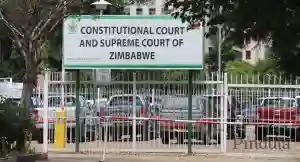The Acting Chief Justice Elizabeth Gwaunza has sworn in the five newly appointed Constitutional Court judges so that they can begin their mandate.
Justices Paddington Garwe, Rita Makarau, Anne-Mary Goora, Ben Hlatshwayo and Bharat Patel are now substantive judges of the Constitutional Court.
The five were appointed to the Constitutional Court bench by President Emmerson Mnangagwa from the list of nominees prepared by the Judicial Services Commission (JSC) following public interviews held in September last year.
Justice Happias Zhou, who reportedly came third during the interviews, Justices Chinembiri Bhunu, Charles Hungwe, Smart Mirirai, Donald Stevenson Corke, David George Bartlett (Retired) and lawyer Arnold Tsunga were overlooked for the posts.
The need for Constitutional Court judges arose following the split of the Supreme Court and Constitutional Court benches in May last year in compliance with the Constitution, which provides for the separation of personnel manning the two courts.
The Chief Justice and Deputy Chief Justice sit on the Constitutional Court by right, but the other five judges are appointed as individuals from the pool of qualified and experienced candidates.
Zimbabwe currently does not have a substantive Chief Justice after the High Court on Saturday ruled that the extension of former Chief Justice Luke Malaba’s tenure by President Mnangagwa was unconstitutional.
Meanwhile, University of Kent law lecturer Alex Magaisa noted grey areas in the appointment of the Constitutional Court judges. He wrote on Twitter:
The letter announcing the appointment of judges to the Constitutional Court is odd & vague so that it is not possible to determine the law under which they are being appointed. It says the President has “approved” the appointments “at the instance” of the Acting Chief Justice.
The letter is coming from the Judicial Service Commission. The “approval” bit is perplexing. It’s either the President appoints or he doesn’t. Whether before or after Amendment No. 2, he is the appointing authority. If they are acting judges, his approval is irrelevant.
True the judges take their oath before the Chief Justice but it is unclear whether they are being appointed under the old procedure when they were interviewed last September or as amended by Amendment No. 2. But does it make any difference to the contentious cases? None.
There is no difference because all the judges are parties in the proceedings concerning Amendment No.2. They are still conflicted and the fact that they are being sworn in doesn’t change their station. If you have a brown cow and you paint it black, it’s still the same cow!

